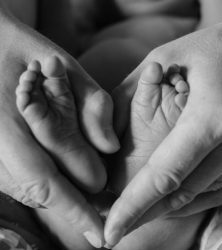Until this week when it emerged that Meghan Markle has hired a Doula for her imminent birth most people had never heard of a Doula. In fact when they first hear the word many people think I’ve said ‘Jeweller’ or ‘Dealer’, neither of which are even close. So what are we and what do we do?
Most newspapers have described us as Professional Hand Holders which although it might sound a bit derogatory, isn’t far from the truth. We are NOT medical professionals but we ARE trained. We are knowledgeable but without the clinical responsibilities of the Midwife or Obstetrician we are free to concentrate on our clients physical and emotional well-being.
Doula work is split into ‘Birth Doula’ work and ‘Postnatal Doula’ work. A Birth Doula will first meet with her client a couple of times in the latter half of the pregnancy to get to know her clients, their wishes for the birth, and the little things that help them relax. Birth is all about Oxytocin (more on that in a later blog), so it is imperative that the Doula understands her clients, what helps them relax and what might make them ‘fight or flight’. During these sessions she may provide additional information or help her clients explore their options in terms of where to give birth; non-medical pain relief; medical pain relief; induction, cesarean or physiological birth.
Armed with this information and having built a trusting relationship with her client the Doula is then on call, usually for a month, around the babies’ due date. When the mother goes into labour the Doula will be there, offering comfort and reassurance as well as practical ideas for coping with the demands of labour. Part of our job is to support the partner too. Men can be wonderful birth partners but they may have a tendency to get excited or anxious, adrenaline flows and that unfortunately is the chemical opposite of the hormones needed for birth. Some dads recognise they are happier outside the birthing environment and happy in the knowledge the doula is there for his partner.
Whilst hand holding sounds a bit wishy washy there is actually plenty of good, conclusive scientific research into the benefits of a Birth Doula. A Cochrane review of all the research available sums up the benefits as:
- decrease in the risk of Cesarean
- increase in the likelihood of a spontaneous vaginal birth
- decrease in liklihood of instrumental delivery
- decrease in the use of any medications for pain relief
- Shorter labours by 26 minutes on average
- decrease in the baby’s risk of a low five minute Apgar score (used by medical professionals to assess the babies’ wellbeing
- 27% decrease in the risk of being dissatisfied with the birth experience
Postnatal Doulas work with the family, usually for about 6 weeks immediatley after the birth. They visit the family, in their own home for a few hours, multiple times a week, the exact arrangemnet depending on the family’s needs and circumstance.
Becoming a parent is an emotional rollercoaster. The Doula can provide emotional support, a listening ear, be an experienced friend as well as helping practically in whatever way is needed. That might be doing the laundry, the washing up, breastfeeding support, walking the dog, preparing some nutritious meals or taking the baby for an hour while Mum catches up on some sleep.
A Doula is NOT a nanny or maternity nurse. Whilst she will happily help with the baby that is not her primary role – that is to help the parents transition into life with a (another) infant, and to help them become the best parents possible. A doula will be happy if by the end of the 6 weeks she isn’t needed anymore, that is when she truly knows she has acheived her goal.
Now if reading that Meghan Markle has hired a Doula has made you think they are just for the privelaged, think agian. Societies all over the world have traditions of supporting, nurturing and educating new Mums. As birth has become more medicalised and traditional family structures diluted and strained through distance these traditions are undermined and many new mothers find themselves with a new baby and precious little support.
There are thousands of Doulas all of over Britain, and most are willing to negotiate their fee for those in need. Doula UK runs an ‘Access Fund’ providing private Doulas to those who cannot afford to pay. Many Doulas volunteer for charitable organisations such as Birth Companions which provides support for some of the most vulnerable and dissadvantaged groups in Britain, including women and babies in prison.
As my lovely tutor Kikki Hansard recently said “Couples don’t hesitate in spending an average of £27,000 on their wedding day in the UK, but any investment in the birth of their baby doesn’t sit high on the agenda. More focus is spent on clothes, prams, cots and mattresses. Why is that, when the evidence stacks up to prove that a positive birth experience aided by a doula is a very worthy investment?”. Some enlightenned grandparents-to-be choose not to give even more cute babygrows, but club together and given the gift of a postnatal Doula instead.
To find a Doula near you visit Find My Doula, The Doula Register, or
Doula UK.

